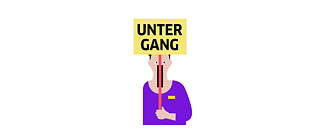Elias Hirschl, author, spoken word artist, musician – and our new columnist – is very surprised by the battle cries of the self-appointed guardians of the German language. After all, it changes in one way or another over time – genderisation here, Anglicisms there.
As a child, I loved the book Der Dativ ist dem Genitiv sein Tod (i.e., The dative is the death of the genitive) by Bastian Sick because I loved everything that had to do with the trials and tribulations of the German language. I also loved his illustrated book Happy Aua (i.e., Happy Ouch), published in 2007, compiled from spelling mistakes in public spaces sent in by readers. I immediately jumped on the bandwagon, looking out for spelling and grammatical errors everywhere in my everyday life, catching every “idiot apostrophe” in pub or hairdresser names like a rare Pokémon.Why so martial?
Today, it makes me a little queasy. For example, when he writes in Der Dativ ist dem Genetiv sein Tod that Sick “sorts out the linguistic rubbish”. Or when he asks whether the “inflationary use of hyphens can still be stopped”? There is talk of a “hail of apostrophes” and that he is “taking up arms against incorrect German and bad style”. Why this martial language? And admittedly, Sick does admit in the book that language “cannot be reduced to an ever-valid, firmly cemented set of rules”, but all these metaphores and language unfortunately remind me strongly of an organisation in which this nagging about incorrect or new-fangled language no longer comes across as quite so playful and well-intentioned and of which Sick himself is apparently still a member: the Verein Deutsche Sprache (VDS; German Language Association).Not so long ago, the VDS unintentionally drew attention to itself when, as researched by the German nonprofit investigative journalism platform Correctiv, it emerged that Silke Schröder (then still on the VDS board) had attended a secret meeting with AfD (German right-wing party) representatives and neo-Nazis in a villa in Potsdam. Of course, you can't extrapolate the behaviour of one person to the whole association – and I don’t want to. But even without this scandal, it can be said that the VDS has some very strange views, to put it mildly. Gendered language is labelled as “nonsense”, “unscientific”, “unconstitutional”, “sexist”, “undemocratic” and “authoritarian”. In 2016, the association’s founder Walter Krämer wrote of the “opinion terror of our largely left-wing lying media” and what is apparently the worst thing for the association: Anglicisms. The VDS even has an anglicism index on its website. You can also report an anglicism yourself if you have found one. The index comprises over 400 pages and contains such “new-fangled” terms as “band” (= Kapelle, Musikgruppe), beer (= Bier) or computer (= Rechner). The only real difference between this and a completely normal English-German dictionary is its claim. The VDS index is not primarily intended to explain the English language, but to counteract it. The aim is to counter Anglicisms “at the early stages of their appearance”. There it is again, this martial language, as if we were talking about a pathogen or a weed. Attached to the index are some “caricatures” as well as a few text contributions by men who actually disqualify themselves anyway with titles such as “No more Englishness!” or “Anglomania and linguistics”.
Harmless apostrophe
All this reminds me of a text by the important philosopher Gottfried Wilhelm Leibniz from 1697 with the wonderful title Unvorgreiffliche Gedancken, betreffend die Ausübung und Verbesserung der Teutschen Sprache (i.e., Unprejudiced thoughts concerning the practice and improvement of the German language). In it, Leibniz warns against the hip, new-fangled terms that young people these days braught back from their studies abroad. Sounds familiar, doesn’t it? Except that in Leibniz’s case, it is not Englishness that is destroying the German language, but the terrible French with their absurd foreign words such as Adresse, Alarm, Akkord, akkreditieren, Attacke and thousands of other terms that seem as German to us today as the most German word that has ever been coined.That’s how language works. It is constantly changing. Gendering doesn’t destroy our language, it makes it more inclusive. Foreign words don’t destroy our language, they open up new horizons. And least of all the apostrophes in Walter’s Wirt’s’stub’n destroy us. The German language is being destroyed anew every day, and that’s a good thing.
Word! The Language Column
Our column “Word!” appears every two weeks. It is dedicated to language – as a cultural and social phenomenon. How does language develop, what attitude do authors have towards “their” language, how does language shape a society? – Changing columnists – people with a professional or other connection to language – follow their personal topics for six consecutive issues.
July 2024
